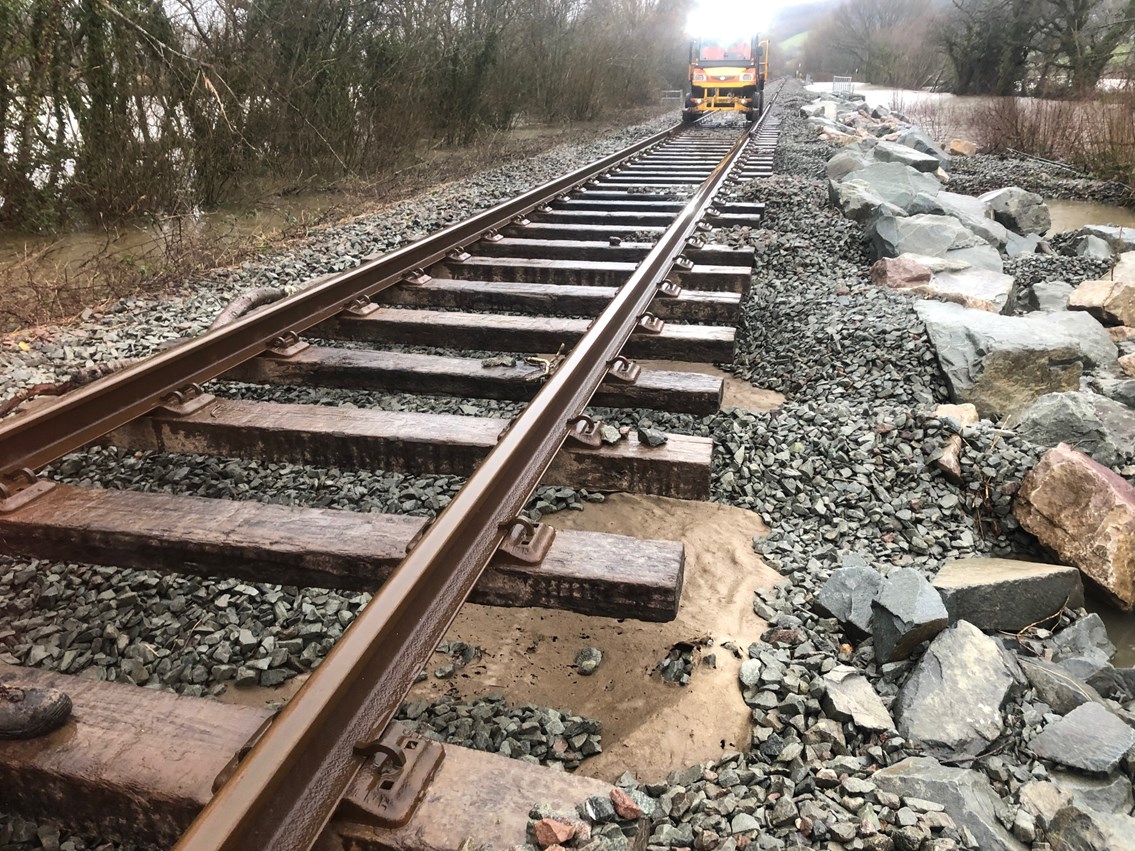Thursday 11 Jun 2020
Additional work to Conwy Valley line aims to prevent long closures due to railway wash out
- Region & Route:
- Wales & Western: Wales & Borders
- | Wales & Western
Network Rail is currently working between Tal y Cafn and Llanrwst to reopen the Conwy Valley line which, for the second time in recent years, has been literally washed away because of flooding. The line runs through fields in an area prone to flooding from the River Conwy.
Extreme rainfall in north Wales in the last two years has caused significant flooding in this area and the power of the rising water has washed away the line. This has resulted in the line being closed for several months whilst it has been repaired. In 2020 alone this has cost £1m to the taxpayer and prevented passengers from using the railway for to get to school, work and other journeys.
Whilst work continues to reopen the Conwy Valley line following its most recent flooding, Network Rail has now identified additional work, on top of reinstating and re-opening the current line, to help protect the line from being washed away on this catastrophic scale in the future.
This work includes installing rock armour and this will help to add additional resilience to the line. Around 20,000 tonnes of rock will be installed to just over a mile of embankment. Work carried out by Network Rail in 2019 was successful in protecting the line south of Llanrwst from more significant damage during this year’s storms. This will now be replicated along further sections of the line.
The work will cost around £2.2m and will extend the closure for an additional 10 weeks, however this investment and continued disruption to passengers will be worth it to mitigate the risk of long closures due to wash-outs in the future.
The line will be reopened following this work, which is expected to be completed in September.
Bill Kelly, Network Rail’s route director for Wales and Borders, said:
“The Conwy Valley Line has been hard hit by storms in recent years and we know how frustrating this has been for the passengers and local communities for whom the line is a social and economic lifeline.
“Whilst there is never a good time to close the railway, the work we are carrying out to make the railway more resilient will help to future proof the line and make it more reliable in the future for passengers.
“We know how important the Conwy Valley Line is for the local communities it serves and we would like to thank you for bearing with us once again.”
Local Councillor Philip Evans, Chairman of the Conwy Valley Railway Partnership, said:
“It makes sense to carry out the extra works whilst there are restrictions on travel generally. This will avoid another line closure when things are returning to normal and ensure services are not interrupted after a short restoration.”
Contact information
Passengers / community members
Network Rail national helpline
03457 11 41 41
Latest travel advice
Please visit National Rail Enquiries
Journalists
Steven Crane-Jenkins
Media Relations Manager
Network Rail (Wales and Borders)
07732 643228
Steven.Crane-Jenkins@NetworkRail.co.uk
About Network Rail
We own, operate and develop Britain's railway infrastructure; that's 20,000 miles of track, 30,000 bridges, tunnels and viaducts and the thousands of signals, level crossings and stations. We run 20 of the UK's largest stations while all the others, over 2,500, are run by the country's train operating companies.
Usually, there are almost five million journeys made in the UK and over 600 freight trains run on the network. People depend on Britain's railway for their daily commute, to visit friends and loved ones and to get them home safe every day. Our role is to deliver a safe and reliable railway, so we carefully manage and deliver thousands of projects every year that form part of the multi-billion pound Railway Upgrade Plan, to grow and expand the nation's railway network to respond to the tremendous growth and demand the railway has experienced - a doubling of passenger journeys over the past 20 years.
Follow us on Twitter: @networkrail
Visit our online newsroom: www.networkrailmediacentre.co.uk

